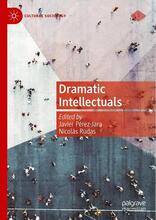CCS Faculty Fellow Javier Pérez-Jara and CCS Junior Fellow Nicolás Rudas are pleased to announce the publication of their coedited volume, Dramatic Intellectuals (Palgrave Macmillan’s Cultural Sociology Series, 2025)! The book includes chapters by CCS Fellows Jeffrey Alexander, Ron Eyerman and Celso Villegas.
Here’s a quick overview of the book:
Dramatic Intellectuals advances meaning-centered approaches to understanding the social construction of public intellectuals and their enduring influence on contemporary societies. The contributors reject reductionist perspectives that depict intellectuals and their ideas as mere byproducts of broader social forces. Instead, the volume champions a multidimensional approach that recognizes the semi-autonomy and causal power of intellectual discourses. At the core of this framework is the concept of dramatic intellectuals—figures who navigate collective anxieties and hopes, shaping public discourse through master narratives of salvation and catastrophe, utopia and apocalypse. Through diverse case studies, the volume identifies key features of their master stories, including stark binaries, the social construction of meta-adversaries and meta-saviors, the mobilization of cultural traumas and ideological packs, and the Cassandra complex. Each chapter examines at least one pivotal dramatic intellectual within her cultural context, exploring how these figures shape public discourse and collective imagination. The volume covers a diverse range of intellectuals, including Karl Marx, Sigmund Freud, Carl Jung, Frantz Fanon, Jean-Paul Sartre, Bertrand Russell, Noam Chomsky, Arne Naess, Ingemar Hedenius, Ayn Rand, Otis Eugene “Gene” Ray, Pedro Almodóvar, Agustín Laje, Slavoj Žižek, Jordan Peterson, and Giorgio Agamben. Beyond detailed case studies, the book lays the groundwork for new research agendas in the sociology of intellectuals. This book will be essential reading for scholars of cultural sociology.
In addition to serving as editors, Javier Pérez-Jara and Nicolás Rudas contribute three chapters to the volume. The first, co-authored by both, is titled “Who Are the Dramatic Intellectuals and What Do They Do? A Cultural-Sociological Analysis.”
Drawing on cultural sociology, we challenge reductionist perspectives that portray intellectuals as mere epiphenomena of social structures. Instead, we advocate for a multidimensional approach that acknowledges the semi-autonomy and causal power of intellectual discourses. We provide a concise historical overview of how intellectuals have been theorized, tracing perspectives from Comte to contemporary scholars such as Camic, Gross, and Collins. This overview serves as both an introduction to the sociology of intellectuals and an exploration of cultural sociology’s distinctive contributions to the field.
At the heart of our framework is the cultural-sociological concept of dramatic intellectuals—figures who navigate collective anxieties and hopes, shaping public discourse through master narratives of salvation and damnation. These intellectuals often position themselves as pivotal actors in an epic struggle between utopian and apocalyptic forces. Through diverse examples, we identify key features of their master stories, including stark binaries between the good-sacred-pure and the evil-profane-polluted, the social construction of meta-adversaries and meta-saviors, the mobilization of cultural traumas and ideological packs, and the Cassandra complex.
Following contemporary cultural sociology, our analysis offers a renewed understanding of the intellectual sphere, illuminating how intellectuals influence—and are influenced by—the social world. We argue for a deeper appreciation of the social power of ideas, the complexities of cultural production, and the enduring role of intellectuals in shaping contemporary societies.
Javier Pérez-Jara contributes a solo chapter titled “Lord Bertrand Russell, Prophet of the Industrial Apocalypse.”
Abstract: This chapter presents a cultural-sociological analysis of Lord Bertrand Russell (1872–1970) as an archetypal example of a dramatic intellectual in the twentieth century. Following a cultural-sociological approach, I argue how collective fears and hopes, from mild to radical ones, are much more than the direct psychological and social consequence of events’ ontological, intrinsic impact. Rather, they are master stories woven with semi-autonomous cultural codes and narrations. First a prophet of the industrial Golden Age and later a prophet of the industrial Apocalypse, Russell’s binaries and master stories about science, religion, communism, the United States, nuclear bombs, and the Vietnam War are among the most prominent of the twentieth century. That the person who was, for many, the greatest herald of logic and reason in the twentieth century was also one of the most iconic prophets of an industrial Doomsday is a social fact that can only be properly understood from the point of view of cultural sociology. Despite Russell’s changes of views, I show how we can always find a common symbolic structure underpinning his diverse narratives around science, progress, and apocalypse: in different moments of the twentieth century, the whole world faces absolute evil represented by a meta-adversary, and the only way to avoid total catastrophe is by following Russell’s prophetic recipes.
Nicolás Rudas also contributes a solo chapter titled “Satire, Conspiracy, Dystopia: Agustín Laje’s Genre Work for the Latin American Reaction.”
Abstract: This chapter presents a narrative analysis of the books of Agustín Laje, a rising intellectual star in the Latin American far right. It argues that the significance of his books does not reside in the presentation of novel ideas or theories but in an attempt at re-imagining and recreating the far-right audience through the reorganization of familiar ultraconservative themes (anti-communism, anti-progressivism, etc.) into innovative dramatic structures. I reconstruct how from an initial incursion in “satire”, Laje’s books evolved into the narrative genres of “social conspiracy” and “dystopia”. What is distinctive about these last genres is that the characters of their plots are depicted less as identifiable individuals and more as abstract social forces. Such a shift is key in three senses: as a form of intellectual self-legitimization, as a way of establishing more multifaceted forms of moral polarization, and as a way of offering new models for political engagement.
